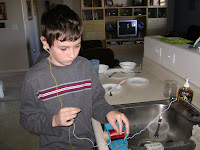One of the greatest examples of a mentor is our Savior, Jesus Christ. He modeled what He taught and was the highest example of a great mentor. His words are repeated and revered throughout the generations as He taught all of us with love and patience.
Professors
A professor or teacher is often presented with several students in which to teach. In the public school system, this is often 30 or more students. A central curriculum is followed regardless of ability or interest and each student is taught in the same way, at the same time.
Mentors
A mentor is an educated person, or one strongly seeking an education, who provides guidance as to a student's individual needs, education goals, and abilities. Special attention is given to the learning styles of each student, giving the student a specialized and highly motivational educational path. Challenging as this may seem, my children seem to find this more exciting and easier than a standardized curriculum. They "own" their education as it is specific to them.
How We Apply This Key
We started with having each person make their Education Goals list. This list changes throughout the year and I evaluate each person's list during my Six Month Inventory time. During my education in education (I went to school to be a teacher but did not complete the degree) I learned about learning styles and multiple intelligences (See Multiple Intellegences by Dr. Howard Gardner). I believe that children and adults have specific ways that they learn best. I have spent time determining how each of my children learn best and work to provide ways to model and teach the subjects as needed.
In learning to be a mentor I think the hardest thing for me is what we call "staying off of the Conveyor Belt". Since I was educated using the Conveyor Belt method, it is hard for me to apply a different way of educating my family. Yet I find that as I continue to study the Leadership Education book by Dr. Oliver DeMille, I am able to find ways to apply this method and find it easier and easier to stay on the right path.
.JPG)









